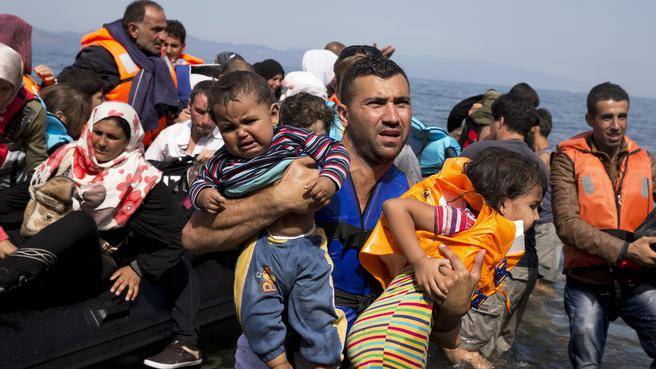Isla Cunningham looks at Glasgow’s reaction to the current refugee crisis. She explores what the city, as well as Glasgow University, is doing to help those making the dangerous journeys for a safer life.

Europe is facing one of the biggest migrations of people towards its borders in history. 60 million individuals worldwide have recently been displaced from their homes, either by human rights violations, prosecution, terrorism or general conflict. Certain governments have tackled irregular migration by tightening border controls. Subsequently, the EU borders have become the most dangerous in the world. More than 350,000 people have crossed the Mediterranean so far this year, and at least 2,500 have lost their lives trying.
Cameron’s announcement to accept 20,000 Syrian refugees over the next 5 years falls embarrassingly short of the efforts of other EU countries. In one day this year, Germany accepted 10,000 Syrian refugees. Cameron’s argument is that to accept more would be to encourage migrants to make the dangerous journey to the UK. However, this ignores the thousands of illegal immigrants who have already made it to the UK – as well as those in Calais – that are forced to trespass the channel tunnel because the UK government will not issue them a visa.
Attitudes towards immigration in Scotland are more positive than the rest of the UK. 27% of Scots think immigrants can have a positive influence on society, compared to just 22% of Brits. Glasgow is a city that owes its existence to migrants, a fact which seems absorbed into our collective conscience and is evident in the response to the refugee crisis so far. 14,000 people showed their support on the “Glasgow Supports Syria” Facebook page, and many Glaswegians are doing everything they can to make sure the migrants and refugees that do reach the UK feel welcome.
Interfaith Glasgow is an organisation that promotes the integration of new migrants, refugees and Asylum seekers into Glaswegian culture. I attended an event of theirs called the weekend club in Pollokshields where new migrants and refugees were invited to take part in interactive language lessons in Glaswegian slang and share international cuisine.
Between activities people exchanged pieces of language from their mother tongues, tips about their favourite sites and places to visit in Glasgow and stories about the journeys they made to the UK. I spoke with an Ethiopian who made the journey to Italy by boat. “I will never in my life forget that journey, everyday I wake up and thank God that I made it”.
Its founder, Mohammed, explains that this is more than just a weekend club: “it’s not about victimising anyone. Glasgow has a rich history of immigration so it’s about letting new migrants know: we’re all the same, we’re all in this together, you can feel at home here.”
Volunteers at interfaith are not only drawn from a cross section of religions, but also ethnicities and generations. Mohammed recalls: “when I first started this programme three months ago I applied for volunteers and thought I would get maybe a few responses, but the results were amazing – I had people contact me from all over the country, that response really moved me and continues to encourage me now”.
Two of the volunteers are a husband and wife who used to be Jehovah’s Witnesses. They joined Interfaith Glasgow to combat extremism, which they said: “thrives off of the feeling that you are alone and unwelcome – the Weekend Club is a programme that tries to combat that”. The volunteers at Interfaith are brought together by a fascination with difference of culture and a genuine determination to break down barriers and establish connections with people.
At Glasgow University too, there has been a tangible response to the Refugee Crisis. Glasgow announced at the beginning of this academic year that it would be awarding four fee waivers, one for each of the colleges. Professor Anton Muscatelli, Principal and Vice-Chancellor of the University, said: “We are facing a major refugee crisis in Europe and, as it has done so many times in the past, the university community is responding in a meaningful, tangible way.”
The University has recently renewed its membership to CARA, the Council for At Risk Academics, formed in 1933 by academics and scientists. It was through CARA that refugees fleeing the Nazi regime were offered accommodation during the Second World War.
Mohammed and Joury (names have been changed) are a husband and wife who decided to leave their positions as lecturers at Damascus University when the Police asked them to report names of students who were “potential troublemakers”. Mohammed said “They said it was either you or them. The campus was turning on itself. It was brutal, merciless. Academics were targeted by the state and Isis alike.” Thanks to CARA, they are now Phd students at Glasgow. Muhammad has chosen to write his thesis on teacher development and Joury on refugee education, hoping they will be able to put their skills to good use when they return.
Professor John Briggs, Vice Principal, remarked: “I am proud that the University reached out and helped Mohammad and Joury – but I know there are many others who need our help.” Indeed, with 450,000 refugees expected to cross the Mediterranean and arrive in Europe next year, the crisis does not look like it will be over soon, and the University and Glasgow as a whole will be called on to continue offering protection.
To support CARA or any of the organisations mentioned you can visit the GRAMNet pages of the University website.
By Isla Cunningham
